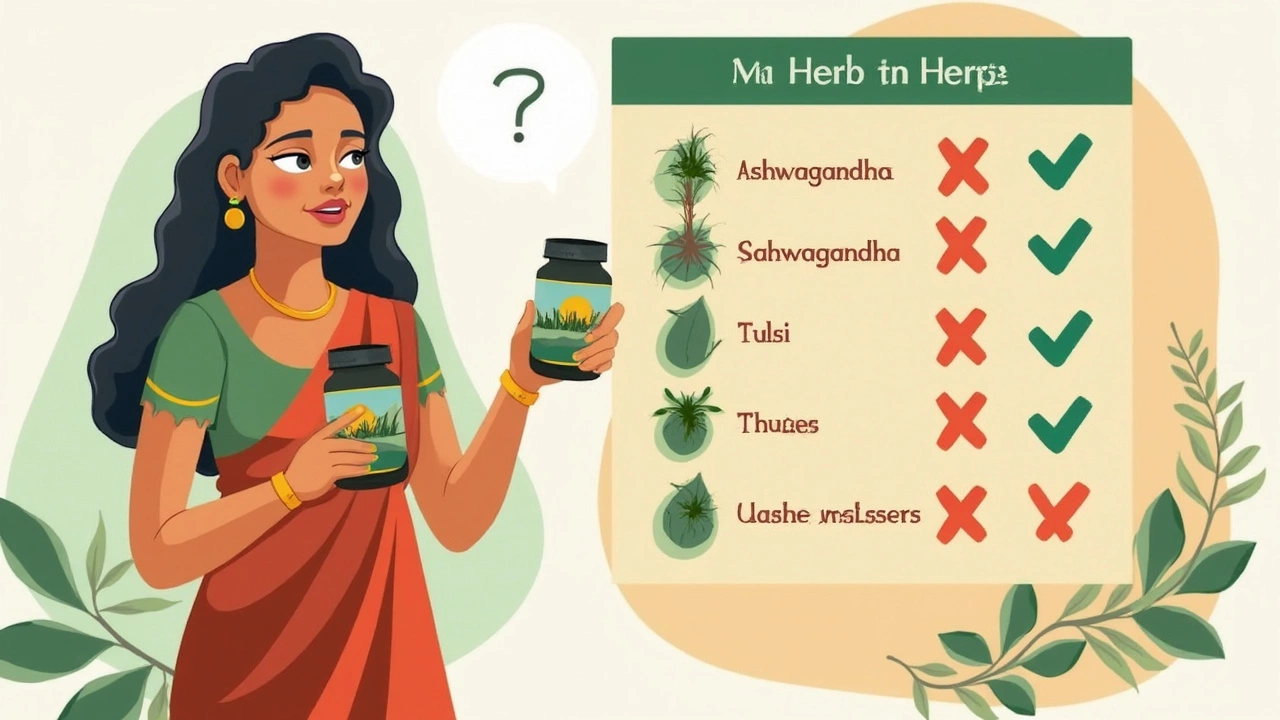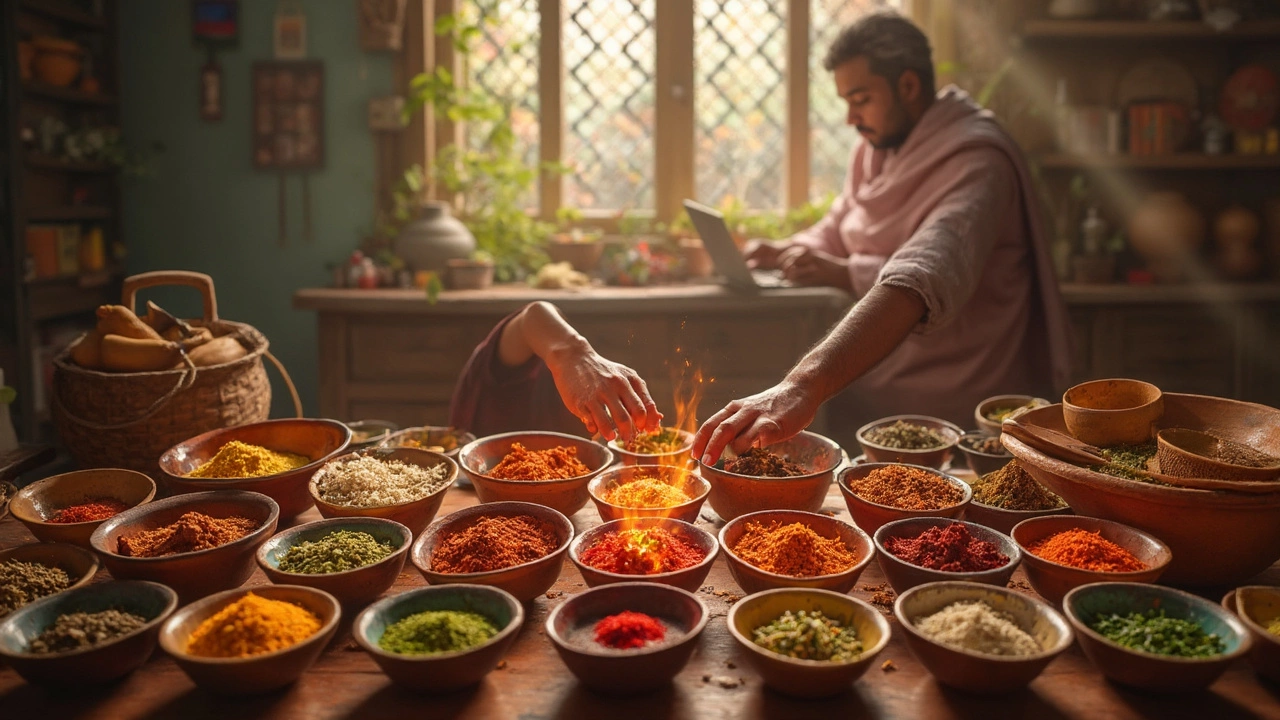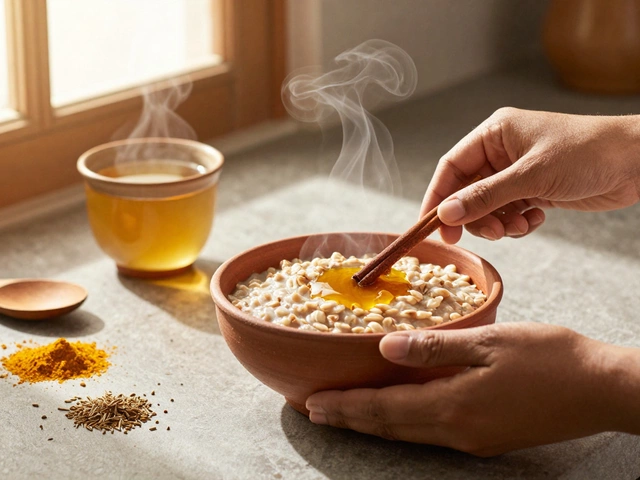Think that mixing all your favorite herbs together is a shortcut to extra health? That's not how it works. Some herbs straight-up clash when combined, leaving you with side effects nobody wants—think headaches, stomach pain, or worse.
Take St. John's Wort, for example. It’s famous for helping mood, but it speeds up the way your liver breaks down medicine. Mix it with other herbs or meds, and you could end up with barely any benefit—or even a dangerous reaction. Then there’s ginkgo biloba, often used for memory. Combine it with blood thinners, or even garlic supplements, and your risk of bleeding jumps.
Don’t trust every supplement blend you see on a shelf, either. Some companies throw together herbs that sound good but actually fight each other or overload your liver. Even if the herbs are natural, they can still cause trouble together.
- Why Herb Combinations Matter
- Common Herbal Conflicts
- Herbs to Avoid Mixing With Medication
- Supplements That Cancel Each Other Out
- Tips for Safe Herb Use
- How to Spot a Bad Reaction
Why Herb Combinations Matter
Mixing herbs isn’t the same as ordering a salad. Some herbs, when taken together, can really mess with each other—and with your body. The big issue? Interactions. These can mean anything from an upset stomach to serious stuff, like bleeding problems or messing up how well your medication works. Sometimes, herbs boost each other's effects, tipping things overboard. Other times, one herb can totally block another, wasting your time and money.
Let’s get real: about 72% of folks who use herbal supplements, according to a 2023 survey in the Journal of Herbal Medicine, said they’ve combined two or more herbs within a week. But less than 40% checked for interactions first. That’s risky, because the body deals with herbs through the same liver enzymes and pathways as lots of regular meds. When two herbs want the same route, traffic jams happen—and you could get double or half the dose you want without knowing it.
There’s also the danger of stacking up side effects. Two herbs that thin your blood, like ginkgo and garlic, can make bruising easier than usual. Or, a stimulating herb plus another energizer might leave you jittery, fast-hearted, and unable to sleep.
| Herb | Main Risk When Mixed |
|---|---|
| St. John's Wort | Reduces drug effectiveness |
| Ginkgo Biloba | Increases bleeding risk |
| Kava | Liver toxicity, especially in combos |
| Garlic | Blood thinner effects |
| Licorice Root | Raises blood pressure |
If you’re taking herbal supplements, don’t just throw things together hoping for extra results. Start slow, ask questions, and remember that herbal supplements are powerful—even if they’re sold over-the-counter.
Common Herbal Conflicts
Some herbal mixes sound harmless but go sideways real quick. Pairing strong herbs isn’t like throwing veggies in a salad; you’ve got to consider their real effects, especially if you’re expecting benefits like better focus or relaxed muscles.
- St. John's Wort + Other Antidepressants: You might think more is better for your mind, but St. John’s Wort combined with other antidepressant herbs (like 5-HTP or SAM-e) can ramp up serotonin in your body to scary levels. This is called serotonin syndrome, and symptoms can include confusion, fever, and even seizures.
- Ginkgo Biloba + Blood Thinners or Garlic: Ginkgo helps memory, but it also thins your blood. Stack it with herbs like garlic, ginger, or ginseng, and your risk of nosebleeds or bruising takes off.
- Licorice Root + Diuretic Herbs (Dandelion, Parsley): Licorice root raises blood pressure and messes with potassium levels. Add in diuretic herbs and your electrolytes can crash out, causing leg cramps or worse.
- Kava + Valerian or Passionflower: These are all calming herbs. Together they can slow you down too much, making you drowsy or woozy in a way that's not fun or safe.
- Ephedra (Ma Huang) + Caffeine Herbs (Guarana, Green Tea): Both speed up your heart. Combine them and your heart can start pounding, skip beats, or trigger anxiety.
Here’s a quick table to show just how these mixes stack up when it comes to side effects:
| Herb Combo | Main Risk | Common Symptoms |
|---|---|---|
| St. John’s Wort + 5-HTP | High serotonin | Headache, confusion, sweating, agitation |
| Ginkgo + Garlic | Easy bruising/bleeding | Nosebleeds, bruises, heavy periods |
| Licorice + Dandelion | Electrolyte loss | Weakness, cramps, high blood pressure |
| Kava + Valerian | Too much sedation | Drowsiness, poor balance, confusion |
| Ephedra + Guarana | Heart trouble | Racing heart, anxiety, high blood pressure |
Sometimes people feel fine mixing herbs for a while, then suddenly get hit by a side effect. Don't assume that just because two herbs feel safe on their own, they’ll play nice together. If you’re ever unsure, it’s always smarter to check with someone who knows the ins and outs of herbal supplements or a healthcare pro who gets how these things work.
Herbs to Avoid Mixing With Medication
If you're on medication and thinking about herbs, you really have to pay attention. Some herbs mess with prescription drugs in ways most people don't expect. These combos can make your meds weaker, stronger, or just unpredictable, and that's a headache nobody needs. Here’s what you should keep an eye on:
- St. John's Wort: This one is notorious for interfering with everything from antidepressants to birth control pills. It cranks up how fast your body clears out medicine, making your prescription work less effectively—or not at all.
- Ginkgo Biloba: People sometimes take this for brain health or memory, but it can thin your blood. If you’re also on blood thinners like warfarin, the combo can lead to unexpected bleeding.
- Garlic Supplements: Fresh garlic in your food is fine. But high-dose garlic capsules, combined with blood pressure or blood-thinning meds, can push your blood pressure too low or increase bleeding risk.
- Ginseng: This one can either raise or lower your blood pressure. Taken along with diabetes or heart meds, ginseng can mess up your numbers, making things unpredictable.
- Licorice Root: Not the candy, the actual root in teas or pills. It raises blood pressure and can throw off heart meds or steroids you might be taking.
Check out this quick table showing what mixes badly with common prescriptions:
| Herb | Problem If Mixed With | Main Risk |
|---|---|---|
| St. John’s Wort | Antidepressants, birth control, HIV meds | Reduces drug effectiveness |
| Ginkgo Biloba | Blood thinners, aspirin | Bleeding |
| Garlic (high-dose) | Blood pressure meds, warfarin | Bleeding, low blood pressure |
| Ginseng | Diabetes drugs, heart meds | Unstable blood pressure or sugar |
| Licorice Root | Steroids, diuretics | High blood pressure, potassium loss |
The main thing? Don’t just toss herbs and prescription drugs together and hope for the best. Always double-check with your doctor or pharmacist before starting any herbal supplements, especially if you’ve got a regular medication routine. And avoid changing doses without professional advice—you could end up with a nasty surprise.

Supplements That Cancel Each Other Out
Ever wonder if your herbal supplements are working against each other? Turns out, some herbs and supplements do the exact opposite when mixed—they knock each other's effects down or even make them useless. This is especially true if you toss several into your morning smoothie or take a handful of capsules together.
Take ginseng and caffeine, for instance. Ginseng is hyped for energy, but if you’re sucking down coffee at the same time, the caffeine might overpower the ginseng’s steady boost, leading to jitters instead of focus. Another mismatch? St. John's Wort and melatonin. People often use both for mood and sleep, but St. John's Wort can break down melatonin faster in your body, so you don’t get the rest you want.
Here are some cases where herbal supplements block or weaken each other:
- Echinacea and immunosuppressants: Echinacea ramps up immune function, while immunosuppressants do the opposite. If you take both, neither can do its job well.
- Green tea and iron: Green tea contains compounds that make it hard for your body to absorb iron. If you’re already low on iron, pairing the two may make things worse.
- Valerian root with stimulants: Valerian calms your nervous system, but if you mix it with anything stimulating (like guarana or even heavy green tea), you'll probably just cancel out what each does.
- Licorice and potassium supplements: Licorice root can lower potassium levels, so taking potassium supplements right after might not move the needle effectively.
Want to see how these combos play out? Here’s a quick breakdown:
| Herb/Supplement 1 | Herb/Supplement 2 | What Happens |
|---|---|---|
| St. John’s Wort | Melatonin | Melatonin is cleared faster, sleep benefits drop |
| Green Tea | Iron | Iron absorption goes down—may worsen deficiency |
| Valerian | Caffeine/Guarana | Sleep and calmness benefits reduced or lost |
| Echinacea | Immunosuppressants | Neither supplement works effectively |
The bottom line? If you’re popping more than one supplement, check if they can actually work together. Otherwise, you might be throwing money—and time—down the drain. Always check labels, and if you’re not sure, chat with your doctor or a pharmacist who actually knows their herbs.
Tips for Safe Herb Use
Staying safe while using herbal supplements isn’t rocket science, but you do need a good dose of common sense. Here’s what actually makes a difference:
- Research Each Herb Separately. Before you toss anything into your routine, look up its effects, side effects, and any known interactions. Even chamomile, which seems chill, can mess with blood thinners.
- Start One at a Time. Trying three new herbs at once? Bad idea. Your body can’t tell what’s helping—or what’s hurting—if something goes sideways.
- Check for Known Interactions. The National Center for Complementary and Integrative Health (NCCIH) keeps a running list. Ask your pharmacist to double-check too. Don’t rely just on the label.
- Talk to Your Doctor if you’re on regular medication. Some herbs, like St. John’s Wort or ginseng, work against prescription meds. Your doctor can flag anything risky.
- Go Slow with Dosage. More isn’t better. It’s a lot like working out—pushing it too hard, too soon, just causes problems. Follow serving sizes, and don’t double up if you miss a dose.
- Buy From Reputable Sources. Cheap herbs off random internet sites? Skip them. Pick brands that test for purity and quality—USP or NSF certifications help weed out fakes.
If you want a cheat sheet for risky combos, here’s a quick reference:
| Herb | Problem When Mixed | What to Watch Out For |
|---|---|---|
| St. John’s Wort | Antidepressants, birth control pills, blood thinners | Reduced drug effectiveness or increased side effects |
| Ginkgo Biloba | Garlic, ginseng, aspirin | Higher risk of bleeding |
| Licorice Root | Diuretics, corticosteroids | Raised blood pressure, heart problems |
| Valerian Root | Sleeping pills, anxiety meds | Excessive drowsiness |
| Kava | Alcohol, sedatives | Liver damage, impaired reaction |
Log what you take. A notebook, an app, whatever works—just keep track. If you start feeling weird, itchy, dizzy, or get a stomach ache, stop the new herb. If it gets worse, see your doctor pronto. A little caution goes a long way when mixing with herbs.
How to Spot a Bad Reaction
If you’re adding new herbal supplements to your routine or doubling up on different herbs, don’t just ignore what your body tells you. Bad reactions can be sneaky at first and easy to mistake for just having an off day. Knowing the warning signs can help you stop problems before they get serious.
Some classic signs something’s wrong include:
- Rashes, hives, or itchy skin
- Sudden headaches or dizziness
- Upset stomach, cramps, or diarrhea
- Heart palpitations or feeling extra anxious
- Bleeding or bruising more easily, especially if you’re on garlic, ginkgo, or blood-thinning herbs
- Swelling, especially around your lips, eyes, or throat (that’s urgent!)
It doesn’t stop with just skin or stomach issues. Some side effects can be more serious and sneakier, like liver problems or interacting with other medicines you’re taking. If you feel extremely tired, your eyes look yellow, or you notice dark urine, get checked out fast. Those can be signs your liver’s overwhelmed.
Doctors see actual cases every year where people landed in the ER due to mixing herbs. According to a 2023 report in the U.S., about 20,000 ER visits were linked to supplement side effects, and herbs made up a sizable chunk of that number. That’s legit—don’t just brush off bad reactions.
| Symptom | Possible Herbs Involved | What To Do |
|---|---|---|
| Unusual bleeding | Ginkgo, garlic, ginseng | Stop herbs, call your doctor |
| Yellowing skin/eyes | Kava, comfrey, black cohosh | Seek medical help now |
| Severe diarrhea or vomiting | Senna, cascara, licorice | Hydrate and call for advice |
If you’re ever unsure, it’s better to play it safe. Stop taking what you started and get advice from a healthcare provider. And always mention supplements when your doctor asks about medicine—don’t leave them in the dark.





